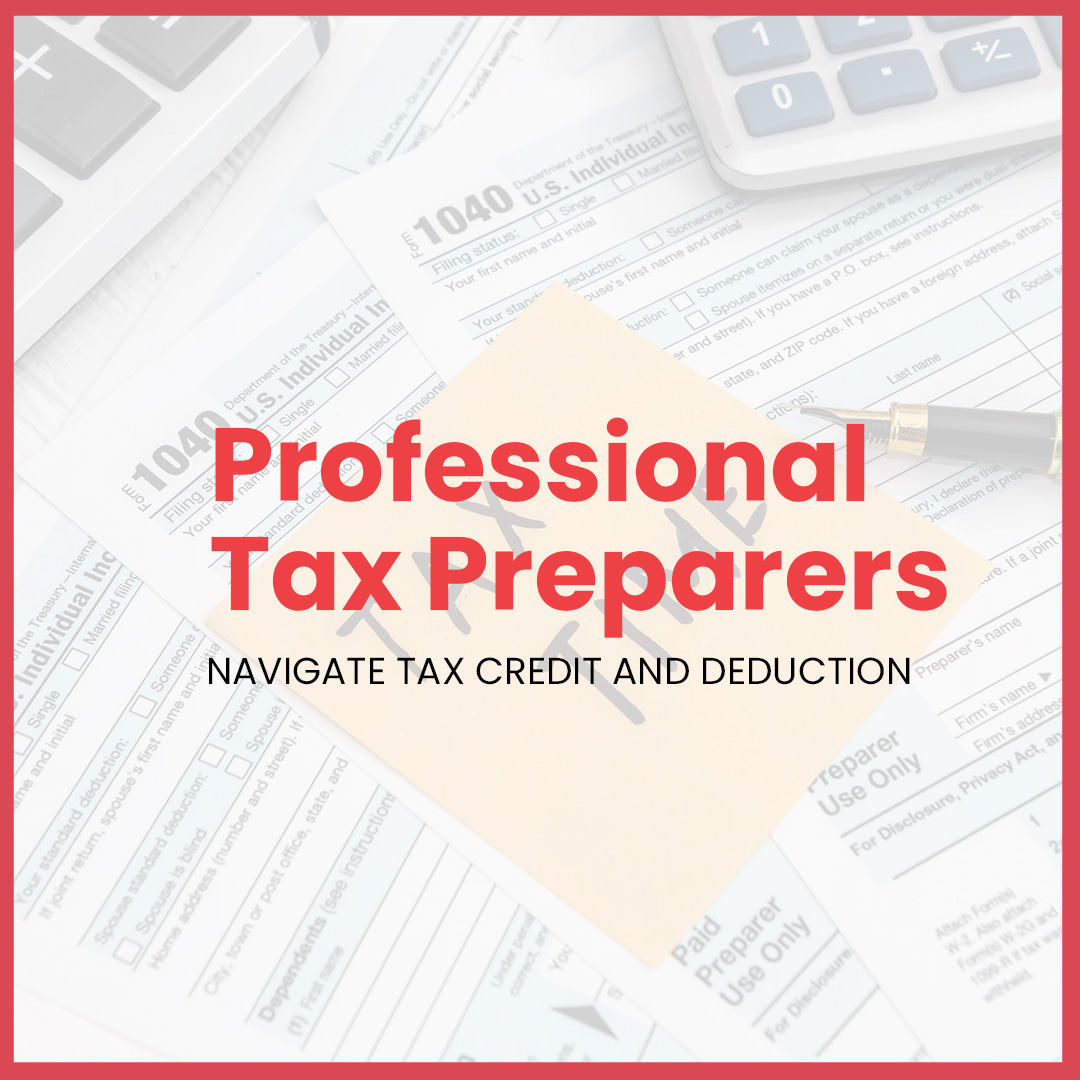Feeling overwhelmed by taxes? You’re not alone. With the April 15th deadline approaching, many people realize they might miss valuable tax benefits. As professional tax preparers, we designed this guide to help you navigate tax credits and deductions, even starting from scratch.
Maximizing these benefits can significantly reduce your tax bill or even get a refund!
The following guide will help you learn:
- The difference between tax credits and deductions: We’ll explain how each works and how they can save money.
- Which deductions you can itemize: Discover a comprehensive list of potential itemized deductions, including medical expenses, charitable contributions, and mortgage interest.
- Whether you should itemize or take the standard deduction: We’ll help you determine the best option for your unique tax situation.
- Common tax credits you may qualify for: Explore various tax credits available, such as the Child Tax Credit and the Lifetime Learning Credit.
Don’t let valuable tax savings slip through your fingers! Read on to learn how to make the most of your tax return.

Understanding Tax Credits & Deductions – The Basics
Ever wonder how some people seem to pay less in taxes than others? Think of those billionaires. Did you know that most billionaires in the US only paid 8.2 percent of their total taxes? For comparison, the average American pays about 13% in taxes. This is because they understand taxes well, including credits and deductions. You might have heard of these terms. Let’s go over the basics to help you better understand what they are. These terms are often used interchangeably, but they work in different ways to save you money on your tax bill.
Imagine taxes like a bill you owe the government. The amount you owe is based on your taxable income, which is your total income minus certain deductions. So, the lower your taxable income, the less tax you owe.
1. Tax Credit
Tax credits act like money coupons. They directly reduce the amount of tax you owe dollar-for-dollar. Think of them like cash discounts applied to your final tax bill. For example, if you qualify for a tax credit of $500 and owe $1,000 in taxes, you’d only need to pay $500.Tax credits can also be added to your tax refunds. Suppose you overpaid your taxes by $1000 and get a tax credit of $500, then you can expect a tax refund of $1500 from the government.
 2. Tax Deduction
2. Tax Deduction
Tax deductions, on the other hand, work like subtractions. They lower your taxable income, which, in turn, decreases the tax amount you owe. Think of them as lowering the price tag before calculating the final cost. For example, if you have $1,000 in deductible expenses and your income is $50,000, your taxable income becomes $49,000. This could potentially lower your tax bill depending on your tax bracket. Contact a professional tax preparer to learn about deductions you can apply for.
Common Examples of Credits and Deductions
Here are some common examples to illustrate the difference:
Tax Credits:
- Child Tax Credit: Provides a certain amount of money per qualifying child.
- Earned Income Tax Credit (EITC): For moderate-earning-income workers.
Tax Deductions:
- Mortgage interest: The interest you pay on your home loan.
- Charitable donations: Money or goods donated to qualified charities.
- Medical expenses: Costs exceeding a certain threshold.
Benefits of Credits and Deductions
So, how can claiming tax credits and deductions benefit you?
1. Lower your Tax Bill
You can potentially owe less in taxes by reducing your taxable income (deductions) or directly taking money off your final bill (credits).
2. Increase your Tax Refund
If the amount of tax withheld from your paycheck throughout the year is more than what you actually owe, you’ll get a refund. Credits and deductions can increase this amount.
3. Simplify Record keeping
Maintaining good records of your finances and deductible expenses can be helpful for future loan applications, budgeting, and tracking your overall financial health. Claiming deductions encourages you to keep organized records, which can benefit you beyond tax season.
4. Reduce Stress and Anxiety
Tax season can be stressful for many people. Understanding tax credits and deductions can give you control and empowerment over your tax situation.
5. Potential for Investment Opportunities
Saving money through tax credits and deductions can free up additional funds you can invest. This could involve contributing to your retirement savings, investing in your education, or starting a business venture.
Common Tax Credits You Might Be Missing
Tax credits offer valuable opportunities to directly reduce your tax bill. Let’s explore some popular credits you might qualify for:
1. Child Tax Credit
The Child Tax Credit is a great benefit for families with qualifying children. To be eligible, the child must be under age 17 at the end of the year, be your dependent, and be a U.S. citizen, resident alien, or national with a valid Social Security number. Additionally, they must have lived with you for more than half the year, with some exceptions for divorced or separated parents.
Claiming the Child Tax Credit is relatively straightforward. Simply file Form 1040 and attach Schedule 8812 to your tax return. It’s important to note that the full credit amount of $2,000 per qualifying child is only available for single filers with income up to $200,000 and married couples with income up to $400,000. The credit then gradually phases out for higher-income earners.
2. EITC
EITC is specifically designed to help low- and moderate-income workers, especially those with qualifying children. Unfortunately, eligibility for this credit depends on several factors, including your filing status, income, and the number of qualifying children you have. The IRS recommends using their EITC Assistant Tool or consulting with a professional tax preparer like ATC Income Tax to determine if you qualify.
It’s important to remember that for the EITC, qualifying children must generally be under age 19 at the end of the year, under age 24, and a full-time student, or be disabled at any age.
3. Additional Child Tax Credit
This partially refundable credit provides additional support to families with qualifying children under age six who already qualify for the regular Child Tax Credit. However, it’s important to know that the credit amount starts phasing out for single filers with income exceeding $150,000 and married couples filing jointly with income exceeding $300,000. For higher-income earners, the credit is reduced to zero.
Additional Credits to Explore
- Lifetime Learning Credit: This credit helps offset education expenses for qualified individuals.
- American Opportunity Tax Credit: This credit offers tax relief for tuition and fees paid for post-secondary education.
Exploring Potential Tax Deductions
Regarding tax deductions, you have two main options: itemizing deductions or taking the standard deduction. Understanding the difference between these options and choosing the one that benefits you most is crucial for maximizing your tax return.
1. Itemized Deductions
Imagine itemizing deductions like creating a detailed list of your expenses. It involves listing out specific expenses that fall under various categories allowed by the IRS, such as:
- Medical expenses: Costs exceeding a certain threshold, including doctor visits, prescriptions, and medical equipment.
- State and Local Taxes: Taxes paid to your state and local governments, such as income or property taxes.
- Mortgage Interest: The interest you pay on your home loan.
- Charitable Donations: Cash or goods donated to qualified charitable organizations.
If your itemized deductions exceed the standard ones for your filing status, then itemizing can lead to greater tax savings. However, keeping track of all your expenses throughout the year requires good record keeping and can be time-consuming.
2. Standard Deduction
It is a pre-set dollar amount the government allows you to deduct from your income. It’s a simpler option that doesn’t require you to itemize your expenses.
Here’s a quick overview of the standard deduction amounts for 2024:
- Single filers: $14,600
- Married filing jointly or qualifying widow(er): $29,200
- Head of household: $21,900
- Married filing separately: $14,600 (each spouse)
3. Choosing the Right Option
Deciding between itemizing or a standard deduction can be tricky. While itemizing might benefit individuals with substantial expenses in certain categories like medical bills or charitable donations, the standard deduction is often the simpler and faster option for many taxpayers.
Here’s a tip: The IRS provides an interactive “Should I Itemize?” tool on its website. Through it, you can estimate your potential tax benefit with both options and be guided toward the most advantageous choice.
Remember, tax laws can be complex, and consulting professional tax preparers like ATC Income Tax can be extremely helpful in navigating these choices and ensuring you take advantage of all the deductions you’re eligible for.
They can analyze your circumstances and recommend the best action to maximize your tax savings and ensure you file your return accurately and efficiently.
Maximizing Your Tax Savings
Now that you understand the basics of tax credits and deductions, here are some strategies to help you maximize your tax return:
1. Strategies for Finding Deductions
-
Keeping Good Records
Gather and organize receipts, bills, and other documentation for potential deductions throughout the year. This could include medical bills, charitable donation receipts, mortgage interest statements, and proof of state and local tax payments.
Having your records readily available makes filing smoother and ensures you don’t miss out on any eligible deductions.
-
Consulting a Tax Professional
Understanding tax laws can be challenging, especially for individuals with complex financial situations or those running their businesses. Consider seeking guidance from a professional tax preparer like ATC Income Tax. They possess the expertise to help you identify all applicable deductions, optimize your filing strategy, and ensure you comply with tax regulations.
Tax professionals like ATC Income Tax can offer several benefits:
- In-depth knowledge of tax laws and regulations: With more than 20 years of experience in the tax industry, we stay updated on the latest tax code changes, ensuring you claim all the deductions and credits you deserve.
- Guidance for complex situations: If you own a business, have multiple income sources, or face unique tax circumstances, we can provide personalized advice tailored to your needs.
- Peace of mind: Knowing a professional is handling your tax return can alleviate stress and ensure it is filed accurately and efficiently.
2. Time-Saving Tips for Filing
-
Tax Filing Software
Utilize tax filing software to streamline the process and minimize errors. These programs can guide you through the filing process, automatically calculate your deductions and credits, and electronically file your return for faster processing.
-
E-filing
Consider e-filing your tax return electronically. This is a secure and efficient way to submit your return directly to the IRS, significantly reducing processing time and expediting your refund.
Resources and Next Steps
Equipping yourself with knowledge is key to navigating the complexities of taxes. Here are some resources to help you on your journey:
- IRS Website: The official IRS website offers a wealth of information on tax forms, publications, filing instructions, and various tax topics.
- ATC Income Tax Website: We have compiled all the information related to tax credits and deductions into an easy-to-understand page on our website. This resource provides a comprehensive overview of various credits and deductions you might qualify for, along with eligibility requirements and helpful explanations.
Ready to take the next step with our Professional Tax Preparers?
If you need further assistance with understanding your specific tax situation, claiming deductions, or filing your return, ATC Income Tax is here to help! Our professional tax preparers possess the expertise and experience to guide you through the process, ensuring you maximize your tax savings and file your return accurately and efficiently.
Contact us today for a consultation, or visit your nearest ATC Income Tax office in Decatur, Milwaukee, or Atlanta to learn more about our services.









